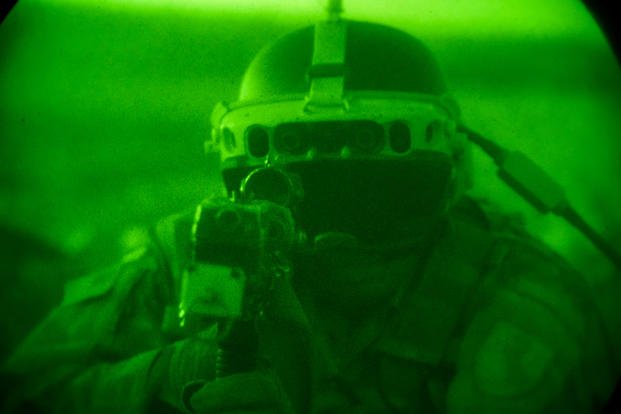As an Amazon Associate, Military.com earns from qualifying purchases.
In the last decade, a certain type of military book has come to dominate national security circles alongside traditional meditations on the future of warfare. Call it the "E-ring thriller": Part technical manual and part speculative fiction, these engrossing techno-thrillers use "FICINT" -- "the combination of fiction writing with intelligence to imagine future scenarios in ways grounded in reality," as the Army War College puts it -- to imagine the near future of warfare with a sense of knowledge and authenticity that evokes the style of beloved authors like Tom Clancy or Michael Crichton. These books aren't just entertaining, but cheat sheets to the forces and trends, technologies and adversaries that will in, all likelihood, shape the next big war (just don't expect to see the powered armor of Robert Heinlein's "Starship Troopers" make an appearance).
The rise of the E-ring thriller has heralded a deluge of books, both gripping fiction and scholarly nonfiction, that have sought to examine the past and present of war and geopolitics to understand their imminent futures. With that in mind, here's a look at some of the best military books that look ahead to coming conflicts -- with a hope that, perhaps, they won't unfold the way they've been envisioned.
1. "Ghost Fleet: A Novel of the Next World War" by P.W. Singer and August Cole (2015)
"Ghost Fleet" is arguably the granddaddy of modern military techno-thrillers, combining geopolitical and diplomatic conflict with real-world weapons platforms in a visceral and often alarming narrative. Set in the not-too-distant future, the novel follows a global conflict ignited by a massive Chinese cyberattack on the United States and the subsequent occupation of the Hawaiian islands, and as traditional warfare merges with cutting-edge technology, a diverse cast of characters must navigate a geopolitical order on the brink of chaos. While "Ghost Fleet" certainly offered a close-up look at future tech like the U.S. Navy's Zumwalt-class destroyer and the service's much-hyped electromagnetic railgun, the book ironically now feels somewhat dated as such weapons have fallen into disfavor or been abandoned outright. Despite this, the crisp writing and engaging narrative make "Ghost Fleet" stand out as the archetypal modern E-ring thriller.
2. "2034: A Novel of the Next World War" by Elliot Ackerman and Adm. James Stavridis, U.S. Navy (Ret.) (2021)
"2034" is, in many ways, a spiritual successor to "Ghost Fleet" (indeed, they both share the same 'Novel of the Next World War' subheading). Authored by former Marine Corps special operations team leader Elliot Ackerman and retired U.S. Navy Adm. James Stavridis, the novel depicts an increasingly tense and chaotic geopolitical landscape where a series of escalating incidents between the United States and its rivals, primarily China and Russia, lead to a devastating global conflict. The story masterfully explores the implications of modern warfare, technology and diplomacy while offering a thought-provoking narrative on the potential consequences of current tensions. Deeply informed by Ackerman and Stavridis' respective experiences in the U.S. military and written in the same brisk style that defined "Ghost Fleet," "2034" offers an urgent vision of a disastrous future war -- and lessons on how to avoid it.
3. "White Sun War: The Campaign for Taiwan" by Maj. Gen. Mick Ryan, Australian Army (Ret.) (2023)
With the U.S. military campaigns in Iraq and Afghanistan winding down after two decades of conflict, every military leader in the United States has quickly reoriented themselves toward the Indo-Pacific, where they believe a future war with China over Taiwan is destined to break out in the coming years. Written by retired Australian Army Maj. Gen. Mick Ryan, "White Sun War" imagines what such a conflict would actually look like, based on the author's more than 35 years of military expertise and as told through the eyes of U.S., Chinese and Taiwanese forces. Featuring near-future technologies like AI-powered robots and unorthodox-yet-realistic units like the brand-new Marine Littoral Regiment, "White Sun War" is a worthy companion and successor to the likes of "Ghost Fleet" and "2034" in combining fiction and intelligence into alarming prescient vision of the next big war.
4. "The Kill Chain: Defending America in the Future of High-Tech Warfare" by Christian Brose (2022)
While "Ghost Fleet," "2034" and "White Sun War" fuse fiction and intelligence, "The Kill Chain" is a work of nonfiction authored by Christian Brose, a longtime national security analyst who currently works as the chief strategy officer at Anduril Industries, a venture capital-backed defense contractor. The book delves into the evolving landscape of modern warfare with a laser focus on the challenges and strategies the United States must navigate to maintain its eroding military edge in an era of rapid technological advancement. Brose offers a comprehensive analysis of how new technologies like AI, autonomous systems and cyber capabilities are reshaping the old dynamics of conflict and national defense. While not as breezy a read as "Ghost Fleet" or "2034," "The Kill Chain" offers an essential and compelling argument for reimagining traditional military structures and embracing innovative approaches in an increasingly complex and interconnected world.
5. "War Transformed: The Future of Twenty-First-Century Great Power Competition and Conflict" by Maj. Gen. Mick Ryan, Australian Army (Ret.) (2022)
The second entry on this list from Mick Ryan, "War Transformed" offers clear-eyed insights and predictions for military planners and practitioners, focusing on the profound impacts of advanced technology, demographic shifts, climate change and renewed strategic military competition on the changing face of warfare. Employing historical and contemporary anecdotes to illustrate the myriad challenges nations currently face amid modern great power rivalries, Ryan contends that a coming "fourth industrial revolution" will fundamentally reshape how we think about warfare and military strength. A love letter to both the evolving character and enduring nature of war, Ryan emphasizes the need for military institutions to adapt strategies, warfighting concepts and intellectual development to navigate the changing landscape of 21st-century competition and conflict effectively.
6. "Burn-In: A Novel of the Real Robotic Revolution" by P.W. Singer and August Cole (2020)
Where "Ghost Fleet" delved deep into the changing dynamics of global warfare, "Burn-In" focuses more on the underlying trends in technology and artificial intelligence and how they're fundamentally reshaping the modern social order. After an FBI agent foils a bombing in Washington, D.C., the agent and her new partner -- an advanced police robot -- find themselves battling against a sequence of escalating catastrophes as they investigate a conspiracy to bring the United States to its knees. Less military future-history and more tech-driven detective novel, but written with the same combination of intensive and meticulous real-world research that made "Ghost Fleet' so appealing, "Burn-In'' captures all the best qualities of a Clancy or Crichton techno-thriller while maintaining the profundity of nonfiction and offering a window into America's wild, wired future.
7. "The Future of War: A History" by Lawrence Freedman (2017)
"The Future of War" is about, well, the future of war, but it's also about war futurists, those who deign to, like those on this list, try to predict what and how the next big conflict might unfold. Through a meticulous examination of pivotal conflicts and strategic shifts over the last century up through the brutal insurgencies in Iraq and Afghanistan, Freedman offers readers an insightful perspective on how the perception and conduct of war have transformed over time, presenting a compelling analysis of the complex interplay between technology, ideology and geopolitics in shaping the battlefield of the past, present and future. Indeed, his historiographical examination ultimately provides a nuanced understanding of the recurring patterns and novel challenges that define the ever-changing landscape of war.
Keep Up With the Best in Military Entertainment
Whether you're looking for news and entertainment, thinking of joining the military or keeping up with military life and benefits, Military.com has you covered. Subscribe to the Military.com newsletter to have military news, updates and resources delivered straight to your inbox.

















